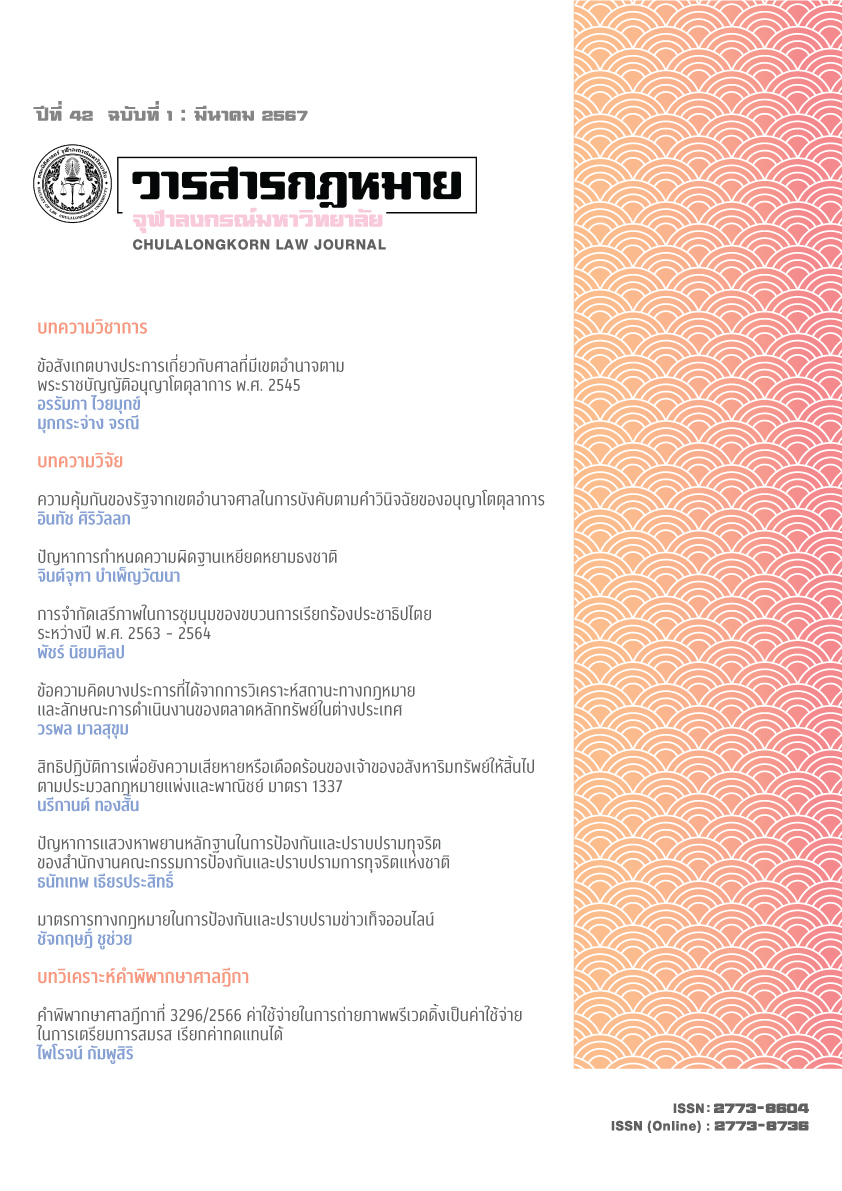การจำกัดเสรีภาพในการชุมนุมของขบวนการเรียกร้องประชาธิปไตย ระหว่างปี พ.ศ. 2563 - 2564
Main Article Content
บทคัดย่อ
เสรีภาพในการชุมนุมเป็นสิทธิที่ได้รับการรับรองและคุ้มครองตามรัฐธรรมนูญและกฎหมายสิทธิมนุษยชนระหว่างประเทศ ปัจจุบันประเทศไทยมี พ.ร.บ.การชุมนุมสาธารณะ พ.ศ. 2558 เป็นกฎหมายเฉพาะสำหรับการดูแลการชุมนุมสาธารณะ แต่เมื่อมีการระบาดของโรคโควิด-19 ขึ้นในปี พ.ศ. 2563 รัฐบาลได้ประกาศสถานการณ์ฉุกเฉิน ตาม พ.ร.ก.การบริหารราชการในสถานการณ์ฉุกเฉิน พ.ศ. 2548 เพื่อจัดการกับการระบาดของโรค ในการนี้ รัฐบาลได้ประกาศข้อกำหนดและกฎจำนวนมากเพื่อจำกัดเสรีภาพในการชุมนุม งานวิจัยนี้มุ่งศึกษารูปแบบการจำกัดเสรีภาพในการชุมนุมของขบวนการเรียกร้องประชาธิปไตยระหว่างปี 2563-2564 และวิเคราะห์อุปสรรคในการตรวจสอบการจำกัดเสรีภาพในการชุมนุม จากการศึกษาพบว่าสาเหตุที่เจ้าหน้าที่รัฐใช้อำนาจจำกัดเสรีภาพในการชุมนุมได้ตามอำเภอใจและไม่สอดคล้องกับมาตรฐานสากลเกี่ยวกับการดูแลการชุมนุมสาธารณะ เนื่องจากผู้มีอำนาจรัฐสามารถกำหนดฐานทางกฎหมายผ่านกฎหมายฉุกเฉินเพื่อสร้างความชอบธรรมในการจำกัดเสรีภาพในการชุมนุมอย่างไรก็ได้ ในขณะที่กระบวนการตรวจสอบการจำกัดเสรีภาพก็ไม่มีประสิทธิภาพและไม่ยึดโยงกับหลักสากลอย่างเพียงพอ สภาวะเช่นนี้ส่งผลให้ขบวนการเรียกร้องประชาธิปไตยในปี 2563-2564 ต้องเผชิญกับการจำกัดเสรีภาพในการชุมนุมที่ไม่สอดคล้องกับหลักสากลส่งผลให้ไม่สามารถชุมนุมเพื่อแสดงออกทางการเมืองได้อย่างมีประสิทธิภาพ
Article Details

อนุญาตภายใต้เงื่อนไข Creative Commons Attribution-NonCommercial-NoDerivatives 4.0 International License.
ลิขสิทธิ์และเนื้อหาในเว็บไซต์ของวารสารกฎหมาย (รวมถึง โดยไม่จำกัดเฉพาะ เนื้อหา รหัสคอมพิวเตอร์ งานศิลป์ ภาพถ่าย รูปภาพ ดนตรีกรรม โสตทัศนวัสดุ) เป็นกรรมสิทธิ์ของวารสารกฎหมาย และผู้ได้รับการโอนสิทธิทุกราย
1. วารสารกฎหมาย ให้อนุญาตให้คุณใช้สิทธิอันไม่เฉพาะเจาะจงที่สามารถถูกถอนเมื่อใดก็ได้ โดยไม่มีค่าใช้จ่าย ในการ
- เยี่ยมชมเว็บไซต์และเอกสารในเว็บไซต์นี้ จากคอมพิวเตอร์หรือเครื่องมือสื่อสารผ่านเว็บบราวเซอร์
- คัดลอกและจัดเก็บเว็บไซต์และเอกสารในเว็บไซต์นี้บนลงคอมพิวเตอร์ของคุณผ่านระบบความจำ cache
- สั่งพิมพ์เอกสารจากเว็บไซต์นี้สำหรับการใช้ส่วนตัวของคุณ
- ผลงานที่ได้รับการตีพิมพ์โดยวารสารกฎหมาย จุฬาลงกรณ์มหาวิทยาลัย ถูกคุ้มครองภายใต้ Creative Commons Attribution 4.0 International License ซึ่งอนุญาตให้ทุกคนสามารถคัดลอก แจกจ่าย ดัดแปลง ส่งต่อ ผลงานได้ ก็ต่อเมื่อผลงานและแหล่งข้อมูลได้รับการอ้างอิงอย่างเหมาะสม
2. วารสารกฎหมาย จุฬาลงกรณ์มหาวิทยาลัย สงวนสิทธิ์ไม่อนุญาตให้คุณใช้สิทธิอื่นใดที่เกี่ยวข้องกับเว็บไซต์และเอกสารบนเว็บไซต์นี้ เช่น การคัดลอก ดัดแปลง เปลี่ยนแปลง ส่งต่อ ตีพิมพ์ แจกจ่าย เผยแพร่ จัดแสดงในที่สาธารณะ ไม่ว่าจะในรูปแบบใดก็ตาม ซึ่งเว็บไซต์หรือเอกสารบนเว็บไซต์ โดยไม่อ้างอิงถึงแหล่งข้อมูลหรือโดยไม่ได้รับอนุญาตเป็นลายลักษณ์อักษรจากวารสารกฎหมาย จุฬาลงกรณ์มหาวิทยาลัย
3. คุณอาจขออนุญาตที่จะใช้เอกสารอันมีลิขสิทธิ์บนเว็บไซต์นี้โดยการเขียนอีเมลล์มายัง journal@law.chula.ac.th
4. วารสารกฎหมาย จุฬาลงกรณ์มหาวิทยาลัย เข้มงวดกับการคุ้มครองลิขสิทธิ์อย่างมาก หากวารสารกฎหมาย จุฬาลงกรณ์มหาวิทยาลัยพบว่าคุณได้ใช้เอกสารอันมีลิขสิทธิ์บนเว็บไซต์นี้โดยไม่ถูกต้องตามการอนุญาตให้ใช้สิทธิ ดังที่กล่าวไปข้างต้น วารสารกฎหมาย จุฬาลงกรณ์มหาวิทยาลัยอาจดำเนินคดีตามกฎหมายต่อคุณได้ เพื่อเรียกร้องค่าเสียหายที่เป็นตัวเงินและคำขอชั่วคราวให้คุณหยุดการใช้เอกสารดังกล่าว ทั้งนี้ คุณอาจถูกสั่งให้ชดใช้ค่าใช้จ่ายใดๆ ที่เกี่ยวข้องกับการดำเนินการตามกฎหมายนี้
หากคุณพบเห็นการใช้เอกสารอันมีลิขสิทธิ์ของวารสารกฎหมาย จุฬาลงกรณ์มหาวิทยาลัย ที่ขัดหรืออาจขัดต่อการอนุญาตให้ใช้สิทธิดังที่ได้กล่าวไปข้างต้น โดยเชื่อว่าได้ละเมิดลิขสิทธิ์ของคุณหรือของผู้อื่น สามารถร้องเรียนมาได้ที่ journal@law.chula.ac.th
เอกสารอ้างอิง
(OSCE) Office for Democratic Institutions and Human Rights & European Commission for Democracy Through Law (Venice Commission), Guidelines on Freedom of Peaceful Assembly 3rd edition (2019)
ACHPR, Guidelines for the Policing of Assemblies by Law Enforcement Officials in Africa (2017)
Alekseev v Russian Federation (25 October 2013) Communication No. 1873/2009 CCPR/C/109/D/1873/2009
Amelkovich v Belarus (29 March 2019) Communication No. 2720/2016 CCPR/C/125/D/2720/2016
Article 21 of ICCPR, Article 11 of African Charter on Human and Peoples’ Rights, Article 15 of American Convention on Human Rights, Article 11(2) of European Convention on Human Rights.
Christof Heyns and Marko Milanovic, "The UN Human Rights Committe's General Comment 37 on the Right of Peaceful Assembly: A Conversation, A webinar hosted by Bonavero Institute of Human Rights 23 February 2021," [online] Available from : https://www.law.ox.ac.uk/events/un-human-rights-committees-general-comment-37-right-peaceful-assembly-conversation [13 January 2022]
Clément Voule, “States responses to Covid 19 threat should not halt freedoms of assembly and association”, Office of the United Nations High Commissioner for Human Rights, 14 April 2020.
Human Rights Committee, Concluding observations on Equatorial Guinea in the absence of its initial report (22 August 2019, CCPR/C/GNQ/CO/1), para 54-55, Human Rights Committee, General Comment 37, para 22.
Human Rights Committee, General Comment 37
Human Rights Committee, General Comment no. 37 (2020) on the right of peaceful assembly (article 21): adopted by the Committee at its 129th Session (29 June-24 July 2020).
Human Rights Committee, General Comment No.37 On the Right of peaceful assembly (article 21) CCPR/C/GC/37, 2020).
ilaw, “ไล่เรียง ข้อกำหนด "ห้ามชุมนุม" ตามพ.ร.ก.ฉุกเฉินฯ” [ออนไลน์] แหล่งที่มา : https://ilaw.or.th/node/6101 [14 มีนาคม 2565].
Maina Kiai, "FOAA Online!:The Right to Freedom of Peaceful Assembly" [online] Available from : http://freeassembly.net/wp-content/uploads/2018/01/FOAA-Online-The-Right-to-Freedom-of-Peaceful-Assembly-update-Nov-2017.pdf [18 March 2022]
Office of the Special Rapporteur for Freedom of Expression of the Inter-American Commission on Human Rights, Protest and Human Rights: Standards on the rights involved in social protest and the obligations to guide the response of the State (2019)
Pat Niyomsilp. Protest Law and Public Order Policing in Hybrid Regimes. Doctoral Thesis, University of East Anglia.
the African Commission on Human and Peoples’ Rights (ACHPR), Guidelines on Freedom of Association and Assembly in Africa (2017)
TLHR, “เปิดคำสั่งไม่ฟ้องคดี พ.ร.ก.ฉุกเฉินฯ ลำปาง ชี้ชุมนุมพื้นที่โล่งแจ้ง ผู้ชุมนุมสวมหน้ากาก ไม่พบการติดเชื้อไวรัส” [ออนไลน์] แหล่งที่มา : https://tlhr2014.com/archives/28755 [15 มีนาคม 2565]
UN Doc A/HRC/44/L.11 [online] Available from : https://ap.ohchr.org/documents/dpage_e.aspx?si=A/HRC/44/L.11 [15 February 2022]
กนกรัตน์ เลิศชูสกุล และ ธนาพงศ์ เกิ่งไพบูลย์, "รายงานเบื้องต้นโครงการวิจัย “การก่อตัว พัฒนาการ และพลวัตการชุมนุมบริเวณแยกดินแดงช่วงเดือนสิงหาคม-ตุลาคม 2564” ภาควิชาการปกครอง คณะรัฐศาสตร์ จุฬาลงกรณ์มหาวิทยาลัย", [ออนไลน์] แหล่งที่มา : https://ilaw.or.th/sites/default/files/Preliminary-report-Kanokrat-25102021.pdf [18 มีนาคม 2565].
กนกวรรณ พุ่มอยู่. เสรีภาพในการชุมนุม: กรณีศึกษาการชุมนุมของประชาชนตามพระราชบัญญัติชุมนุมสาธารณะ พ.ศ. 2558. วิทยานิพนธ์ รัฐศาสตร์มหาบัณฑิต มหาวิทยาลัยรามคำแหง, 2560.
คำสั่งคณะกรรมการโรคติดต่อจังหวัดชลบุรี ที่ 18/2564 เรื่อง มาตรการเร่งด่วนในการป้องกันวิกฤตการณ์จากโรคติดเชื้อไวรัสโคโรนา 2019 หรือ โควิด 19 (Coronavirus Disease 2019 (COVID-19)) ในเขตท้องที่จังหวัดชลบุรี ลงวันที่ 16 เมษายน 2564 [ออนไลน์] แหล่งที่มา : http://www.chonburi.go.th/website/app_form/view146
คำสั่งคณะกรรมการโรคติดต่อจังหวัดเชียงใหม่ ที่ 39/2564 เรื่อง การห้ามดำเนินการหรือจัดกิจกรรมที่เสี่ยงต่อการแพร่โรค ลงวันที่ 17 เมษายน 2564 [ออนไลน์] แหล่งที่มา : https://www.chiangmai.go.th/covid19/assets/pdf/command/39_2564.pdf [8 มีนาคม 2565]
คำสั่งจังหวัดแพร่ ที่ 1130/2564 เรื่องมาตรการป้องกันและควบคุมการแพร่ระบาดของโรคติดต่อเชื้อไวรัสโคโรนา 2019 ในพื้นที่จังหวัดแพร่ (ฉบับที่ 36) ลงวันที่ 17 เมษายน 2564 [ออนไลน์] แหล่งที่มา : http://phrae.go.th/covid/img/new/PP240165P87.pdf [10 มีนาคม 2565]
คำสั่งจังหวัดสุราษฎร์ธานี ที่ 2295/2564 เรื่อง มาตรการเร่งด่วนในการป้องกันการแพร่ระบาดของโรคติดเชื้อไวรัสโคโรนา 2019 (COVID-19) (ฉบับที่ 38) ลงวันที่ 17 เมษายน 2564 [ออนไลน์] แหล่งที่มา : https://www.suratthani.go.th/covid19/document/order/p_no_38.pdf [9 มีนาคม 2565]
ชุธิดา รตนัตจุฑามณี. ปัญหาเกี่ยวกับการชุมนุมสาธารณะในประเทศไทย. วิทยานิพนธ์ปริญญามหาบัณฑิต คณะนิติศาสตร์ มหาวิทยาลัยธรรมศาสตร์, 2556
ณัฐพงศ์ มหานันทโพธิ์. บทบาทของเจ้าหน้าที่ของรัฐตามกฎหมายที่เกี่ยวกับการชุมนุมสาธารณะ. วิทยานิพนธ์ปริญญามหาบัณฑิต คณะนิติศาสตร์ จุฬาลงกรณ์มหาวิทยาลัย, 2553
เดลินิวส์, “ใกล้เคอร์ฟิว ‘ตร.-รถจีโน่’เข้ากระชับพื้นที่ดินแดง โดนยิงพลุไฟใส่เป็นระยะ” [ออนไลน์] แหล่งที่มา : https://www.dailynews.co.th/news/150464/ [18 มีนาคม 2565].
นัทมน คงเจริญ และ วัชลาวลี คำบุญเรือง, “กฎหมายการชุมนุมสาธารณะภายใต้อำนาจรัฐประหาร”, CMU Journal of Law and Social Sciences, 12(2): 40-63, 46.
ประกาศกรุงเทพมหานคร เรื่อง สั่งปิดสถานที่เป็นการชั่วคราว (ฉบับที่ 24) ลงวันที่ 17 เมษายน 2564 [ออนไลน์] แหล่งที่มา : https://www.prbangkok.com/th/news/detail/19/4485 [8 มีนาคม 2565]
ปรีดิ์มนัส มุสิกะนุเคราะห์. กฎหมายเกี่ยวกับการใช้กำลังควบคุมการชุมนุมสาธารณะ: ศึกษาร่างพระราชบัญญัติการชุมนุมสาธารณะ พ.ศ. .... . วิทยานิพนธ์ปริญญามหาบัณฑิต คณะนิติศาสตร์ จุฬาลงกรณ์มหาวิทยาลัย, 2554
พัชร์ นิยมศิลป, "การจำกัดเสรีภาพในการชุมนุมโดยสงบในประเทศไทย” วารสารกฎหมาย จุฬาลงกรณ์มหาวิทยาลัย 3 (1) (2564): 35-58, 44.
พิมลพัชร์ อริยะฌานกุล, "คำวินิจฉัยศาลรัฐธรรมนูญ ที่ 12/2555 วันที่ 28 มีนาคม พ.ศ.2555 เรื่องพระราชบัญญัติขายตรงและตลาดแบบตรง พ.ศ.2545 มาตรา 54 ขัดหรือแย้งต่อรัฐธรรมนูญมาตรา 39 วรรคสอง มาตรา 40(5) ประกอบมาตรา 30 หรือไม่", จุลนิติ (2555): 113-117.
มาตรา 3 พ.ร.บ.การชุมนุมสาธารณะ พ.ศ. 2558
ยรรยง ผิวผ่อง และ ศุภวัฒนากร วงศ์ธนวสุ, "การจัดการชุมนุมทางการเมือง" วารสารบัณฑิตศึกษา มนุษยศาสตร์และสังคมศาสตร์ มหาวิทยาลัยขอนแก่น, 4 (2558): 218-219.
ราชกิจจานุเบกษา เล่ม 137 ตอนพิเศษ 69 ง วันที่ 25 มีนาคม 2563.
ราชกิจจานุเบกษา เล่ม 138 ตอนพิเศษ 173 ง 1 สิงหาคม 2564.
วารุณี วัฒนประดิษฐ์. เสรีภาพในการชุมนุมโดยสงบและปราศจากอาวุธ. วิทยานิพนธ์ปริญญามหาบัณฑิต คณะนิติศาสตร์ มหาวิทยาลัยธรรมศาสตร์, 2551
สมชาย ปรีชาศิลปกุล นัทมน คงเจริญ และปรรณ บุญช่วย, บทเรียนและสภาพปัญหาเกี่ยวกับเสรีภาพในการชุมนุมเพื่อการปรับปรุงพระราชบัญญัติการชุมนุมสาธารณะ พ.ศ. 2558 (กรุงเทพมหานคร: ธรรมดาเพรส, 2563)
สมชาย ปรีชาศิลปกุล, นัทมน คงเจริญ, อุษณีย์ เอมศิรานันท์, ปารณ บุญช่วย คณะนิติศาสตร์, สุทธิชัย งามชื่นสุวรรณ และนิฐิณี ทองแท้, “บทเรียนและสภาพปัญหาจาก พ.ร.บ. การชุมนุมสาธารณะ และอำนาจของศาลในการคุ้มครองเสรีภาพในการชุมนุมสาธารณะ” [ออนไลน์] แหล่งที่มา : https://prachatai.com/journal/2021/03/92270 [3 กันยายน 2565].
สมชาย ปรีชาศิลปกุล, เสรีภาพในการชุมนุมโดยสงบและปราศจากอาวุธตามบทบัญญัติแห่งกฎหมาย : รายงานการศึกษาวิจัย (สำนักงานศาลรัฐธรรมนูญ 2015)
สราวุธ ทับทอง, สถานการณ์ฉุกเฉินและความรุนแรง : ศึกษาความเหมาะสมสำหรับการควบคุมและจัดการการชุมนุมประท้วงของภาครัฐในช่วง พ.ศ. 2552-2553 ผ่านหลักนิติรัฐ (รายงานการวิจัย กองทุนอุดหนุนการวิจัย คณะรัฐศาสตร์ มหาวิทยาลัยธรรมศาสตร์ 2557).
หนังสือ สำหนักงาน ศบค.มท. ด่วนที่สุด ที่ มท 0230/ว4403 ลงวันที่ 1 สิงหาคม 2564 [ออนไลน์] แหล่งที่มา : https://www.moicovid.com/wp-content/uploads/2021/08/มท0230-ว4403-ลว.1ส.ค.64-แจ้ง-ทุกจังหวัด-และ-.กทม.-เรื่อง-ข้อกำหนด-ฉบับที่-30.pdf [24 มีนาคม 2565].


